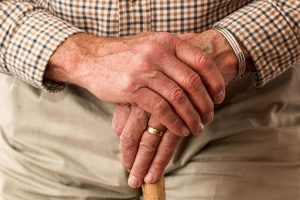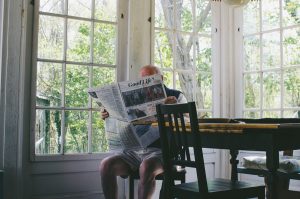Some nonagenarians compete in triathlons while other ninety-year-olds face jail time. Some octogenarians study the game of Chess on the streets of New Orleans and others in their eighties travel across the country headed for baseball diamonds. Some septuagenarians are affected by dementia, live in memory care centers and receive aid with their daily activities; meanwhile, others in their seventies can be found in University lecture halls, sitting on faculty council, and contributing original research. This might read as part of scripted entertainment, however, it’s not. Rather, these images are even funnier when we see them floating in a sea among the tide of what we think of as “the elderly.” Why so funny?
 I am not concerned with entering into the conversation about who is elderly, or these new hip ideas about saying 100 years young (this expression can be equally oppressive as the objectification of “the elderly”).
I am not concerned with entering into the conversation about who is elderly, or these new hip ideas about saying 100 years young (this expression can be equally oppressive as the objectification of “the elderly”).
If we travel back to Britain in 1875, we can read in the Friendly Societies Act, where old age is defined as “any age after 50.” We can also turn to our nation’s leader in aging research and health promotion, The National Institutes of Health and Aging, where many topics are geared toward those of us ages 50 and greater. And so, it’s not a matter of age classification that concerns me, rather it is the objectification of a marginalized group that is of far greater importance. I’m also not particularly interested in developing a categorical understanding of the precise age of the person we are referring to when we say, “The elderly.” Rather, I’m fascinated by some peoples’ use of “the” when referring to a single person and then also ascribing a set of assumptions based on a singular experience or interaction. Yesterday, while standing in line at a local print shop, I heard one person remark to another, “You know how the elderly are…slow and crochety.”
Slow and crochety are common adjectives used to describe people who are elderly. In the Oxford English Dictionary you will find worse-for-wear, moth-eaten, and long in tooth as synonyms for elderly. What happened to using respectful, kind and caring words to define someone who is your elder? We needn’t live in extremes where we ascribe words such as venerable, esteemed, wise, grand or dignified. Although this might apply to some people who are our elders, using these words without license can be just as damaging as the objectification of “the elderly.”
Although common place in the body of literature on aging; the terms “the elderly”, “the old” and “the aged” are frequently used synonymously. What is it about the use of the word ‘the’ that rolls off our tongue so easily when referring to some groups, yet is incredibly offensive when used with other groups? ‘The’ creates a rigid and inflexible view of lives that are dynamic, complex, multidimensional and ordinary. ‘The’ presents a watered-down version of people based on caricatured qualities. ‘The’ creates an assumption of similarity among members. Also, the last of these, “the aged” suggests a past tense, a process having been previously completed. A life already lived. As far as I know, we are continually aging unless we are dead and in which case our subject of interest becomes “the dead”. ‘The’ is embedded in an otherness, a separation, no longer living. And since I’m living, then “the elderly” must be the other.
By saying “the elderly”, we are reducing defining features and valuable contributions of members of our community to singular stereotyped anecdotal evidence. ‘The’ suggests a devaluing of humanness or a perception of less than. Use of the word “the” is paramount to maintaining the age binary: young-old. Yet, this concept of binary is ill-informed. We have coupled two parts of the lifespan that are not guaranteed. Just because you are young, this does not suggest you will be old. It is only when you are old that you can say, “When I was young…”
Age categorization can create a space, a chasm, a divide between us and them. We are gripped by fear of them because we fear we too will become like them, when in fact, becoming elderly is a gift. Not everyone alive now, reading these words, will be so privileged to receive this gift of age. One of the greatest accomplishments in the past 150 years, according to University of California, Berkeley and Max Planck Institute for Demographic Research, Human Mortality Database, is an increase in life expectancy from birth. If more of us are becoming them, then why does a looming fear lurk in the air? Is it because there are more of us alive now than ever before who are adding to the collective fear? Plausible. Is it as Zygmunt Bauman articulates on fear, that aging is a process that happens and so we desperately grasp at the air for psychological consolations? Perhaps.
It’s purely a matter of shifting times that allows us, as a nation, to acknowledge the disrespect in using people as instruments for, in the case of “the elderly”, a continued glamorization of youth. It was not long ago when the proverb “children should be seen and not heard” was quite popular indeed. Dating back to the 15th century, children, and particularly young women, were understood to stay silent unless spoken to or asked to speak. First appearing in Mirk’s Festial , published by a clergyman about 1450, “A maid [young woman] should be seen, but not heard”. In present day U.S. culture, we can see a similar treatment being delivered to our elders to an even greater extent. People who are elderly are not seen and not heard. We don’t want to see them for fear of becoming them, because we have learned to equate aging with death.
All living matter experiences aging from the moment of entering this earth. Just as surely as we age, we too experience death. The two are not correlated, birth and death, yes but age and death, no. Yet, in a culture that denies death, age masquerades as death. Age and death are two distinct processes that are both gifts bestowed upon anyone who is born. In order to untangle these webs of death and aging, fear and loss – we must extract ourselves from an obsession with youth.
By maintaining such strict adherence to youth standards, we further objectify people who age and who are unable to perform youthfully. Conversely, when we are ridiculed, or do the ridiculing, for “acting old”, there are many damaging effects this can create, one of which is internalized ageism. The idea that the only interesting elderly people are either “dazzling or drooling” further reinforces this age binary and a fetishizing of youth. Tina Turner sings, “we don’t need another hero”, but what we need is a recognition of the diversity among people who are elderly. Old comes in many forms.
 As well-intentioned measures are created to protect people who are elderly from abuse, flu and fraud, sometimes these very policies further objectify the people they are intending to help. Headlines read: “How to care for the elderly” Really? There’s a one-size-fits-all approach for caring? I didn’t realize all members of the elderly needed caring for. According to Education First, world leaders in International Education since 1965,“Use the [emphasis in original] with adjectives to refer to a whole group of people.” One of three examples given on their website is: “The elderly require special attention”. How would our world be if we offered special attention to everyone?
As well-intentioned measures are created to protect people who are elderly from abuse, flu and fraud, sometimes these very policies further objectify the people they are intending to help. Headlines read: “How to care for the elderly” Really? There’s a one-size-fits-all approach for caring? I didn’t realize all members of the elderly needed caring for. According to Education First, world leaders in International Education since 1965,“Use the [emphasis in original] with adjectives to refer to a whole group of people.” One of three examples given on their website is: “The elderly require special attention”. How would our world be if we offered special attention to everyone?
On a broad scale, we have witnessed a linguistic shift when referencing minority groups, by many people dropping the definite article ‘the’. Further, some find offense to hearing references like: ‘the blacks’, ‘the gays’, ‘the whites’, ‘the Muslims’, etc. Let us continue with our inclusive practices and start referring to people who are elderly as the individuals they are. If you have the privilege to be compassionate, then please adjust your word order the next time you refer to a vital member of our community and emphasize the person rather than a group to which we assume they belong. If you are involved with policy development, consider suggesting a rewording using more inclusive language. Encourage your local transportation company to entertain ideas of changing stickers on mass transit to read “please reserve the seats for anyone who looks like they need a seat” instead of “for the elderly and the disabled.” And please, omit from your language the phrase: “Wow, you look good for your age.” We all age differently. And some, don’t age at all. They die.
And so, in this massive sea of wonder, awe and possibility, some stay ashore, some wade into the water clinging to their raft of thanatology, while others playfully splash about with exuberance and glee. Come splash with me and people who are elderly. Soon you will see there are differences and similarities between you and people who are elderly.
Adrienne Ione is a cognitive behavioral therapist and personal trainer who integrates these fields in support of people thriving across the lifespan. As a pro-aging advocate, she specializes in the self-compassion of dementia.
Website: yes2aging.com
Guided Meditations: insighttimer.com/adrienneIone
Facebook: silverliningsintegrativehealth
